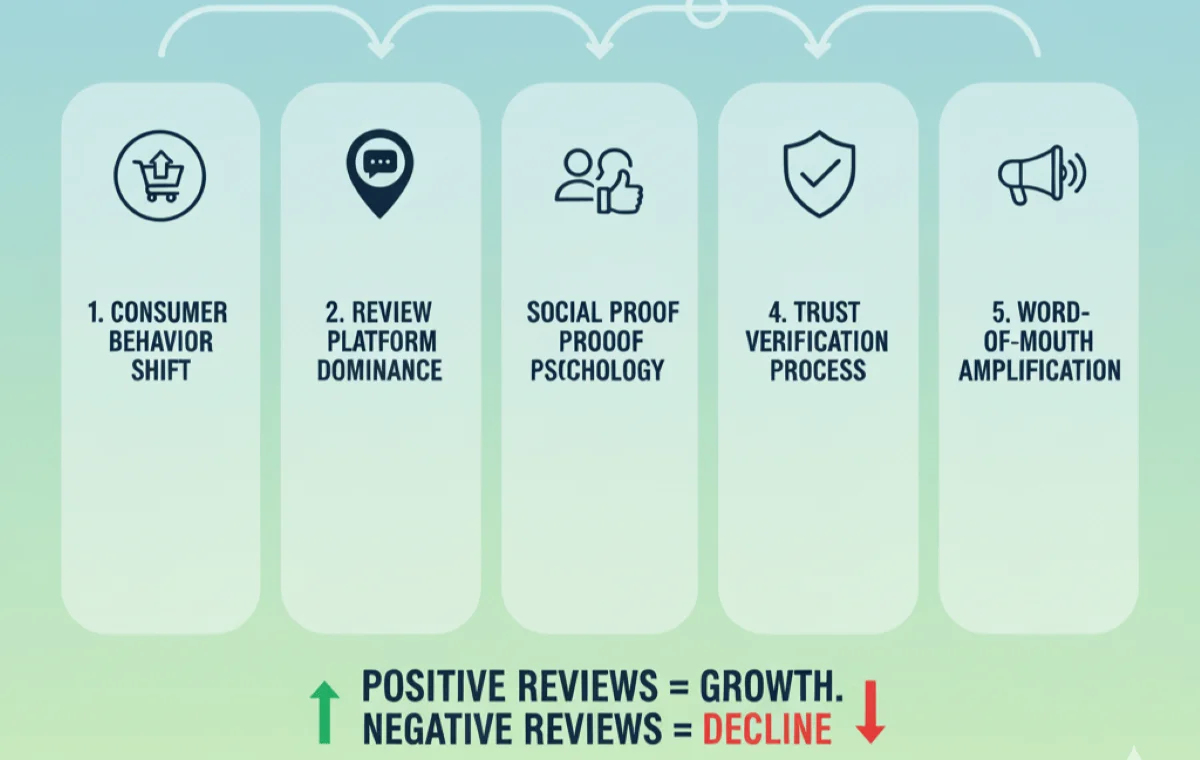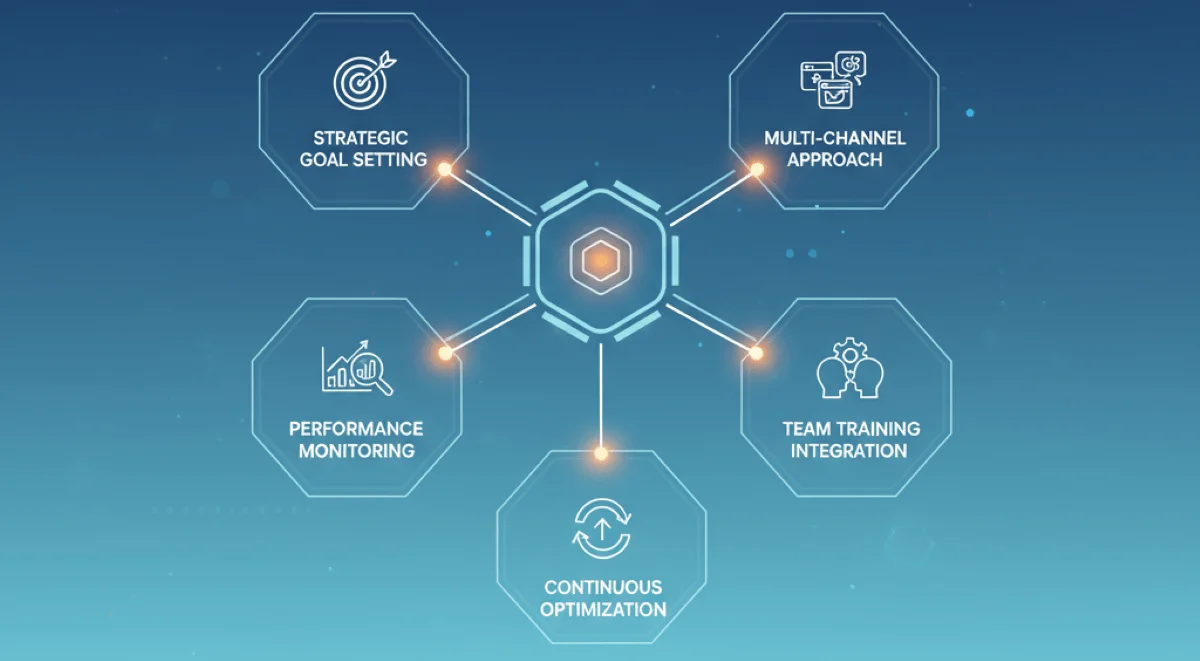
Running a local business today is about much more than good service or competitive pricing; it’s about reputation. Customers form opinions long before they walk through your door, often guided by what others say online. A single review can tip the scales: one customer’s praise can spark new business, while one negative comment left unanswered can quietly erode trust.
Modern buyers lean heavily on digital proof, with reviews influencing nearly every local purchase decision. Research even shows that each extra star on Yelp can increase revenue by up to 9%. That’s why reputation management for local businesses has shifted from optional to essential, separating thriving businesses from those left struggling in today’s digital marketplace.

Why do online reviews make or break local businesses?

Modern consumers operate in a trust-first economy where peer validation is valued more than traditional advertising. Online reviews have become the digital equivalent of personal recommendations, carrying weight and impact in purchase decisions and fundamentally reshaping how local businesses attract and retain customers.
Consumer behavior shift
Today’s customers actively seek authentic feedback before engaging with local businesses, spending time researching options. They scroll through reviews, analyze ratings, and read detailed experiences to gauge service quality, reliability, and value proposition before making purchasing decisions or booking appointments.
Review platform dominance
Google Reviews, Yelp, Facebook, and industry-specific platforms now control local business visibility through algorithmic ranking systems. High ratings boost search rankings and local pack placement, while negative feedback can bury businesses in search results, making reviews essential for discoverability and competitive positioning.
Social proof psychology
Humans naturally follow crowd behavior, making positive reviews powerful persuasion tools that influence decision-making processes subconsciously. When potential customers see others praising a particular business’ service, they’re more likely to choose them over competitors with fewer or lower ratings across platforms.
Trust verification process
Customers use reviews as a verification mechanism, confirming that businesses deliver on their promises and meet advertised standards. Detailed, authentic reviews provide the social proof needed to overcome skepticism and build confidence in purchasing decisions, particularly for first-time customers.
Word-of-mouth amplification
Digital reviews amplify traditional word-of-mouth marketing exponentially, reaching audiences far beyond immediate social circles. A single positive review can reach hundreds of potential customers through search visibility and social sharing, while negative feedback can damage a reputation across entire communities.
Why Reputation Management Gives Local Businesses a Competitive Edge
Local businesses have unique advantages over large corporations when it comes to reputation management. They can build deeper customer relationships and stronger brand connections through personalized service. Community engagement further strengthens their position. Direct owner involvement adds another layer of authenticity, creating lasting competitive advantages.
Personal touch factor
Local businesses can provide individualized attention that large chains cannot match through personalized service and relationship building. This personal connection creates memorable experiences that naturally generate positive reviews and build lasting customer loyalty through genuine relationship-building and customized solutions.
Community integration
Being embedded in the local community allows businesses to participate in events, support causes, and build relationships beyond transactions. This community involvement creates goodwill that translates into positive word-of-mouth and review generation while establishing deep roots that competitors struggle to replicate.
Agility and responsiveness
Small businesses can respond to customer feedback instantly, address concerns quickly, and implement changes rapidly without bureaucratic delays. This agility demonstrates commitment to customer satisfaction and often turns negative experiences into positive outcomes, showcasing flexibility that large corporations cannot match.
Authentic storytelling
Local businesses have genuine stories about their origins, values, and community impact that resonate with customers seeking authenticity. This storytelling ability resonates with customers who prefer supporting businesses with a real purpose and local connections over faceless corporations with generic messaging.
Direct owner involvement
When business owners personally engage with customers and respond to feedback, it creates powerful impressions of accountability and care. This direct involvement builds trust and demonstrates a genuine commitment to customer satisfaction, creating personal relationships that generate loyalty and positive reviews.
How does reputation fuel sales and profitability?
Strong reputation management directly correlates with increased revenue through higher conversion rates, improved customer lifetime value, and enhanced pricing power. The financial impact of reputation extends far beyond immediate sales, creating sustainable competitive advantages that compound over time and drive long-term business growth.
Conversion rate impact
When your overall rating increases by just a single star, businesses can expect jumps in conversions from online listings. Higher ratings reduce customer hesitation and accelerate the decision-making process, leading to more bookings and sales while decreasing the cost of customer acquisition through improved trust signals.
Customer lifetime value
Satisfied customers who leave positive reviews tend to return more frequently and spend more per visit than average. They become brand advocates, referring friends and family, multiplying their value beyond individual transactions and creating a network effect that drives sustained revenue growth.
Premium pricing power
Businesses with strong reputations can command higher prices because customers perceive greater value and quality assurance. Positive reviews justify premium pricing by demonstrating quality, reliability, and superior service that customers willingly pay for, improving profit margins and business sustainability.
Search visibility benefits
Strong reputation improves local search rankings, increasing organic visibility without additional advertising costs and driving qualified traffic. Higher search positions drive more website traffic and phone calls, directly impacting lead generation and sales opportunities while reducing dependence on paid advertising.
Competitive market share
Superior reputation helps businesses capture market share from competitors by becoming the obvious choice for consumers. When customers consistently choose highly-rated businesses over alternatives, market dominance naturally follows, creating sustainable competitive advantages that compound over time and increase profitability.
Expanding reputation strategies beyond review sites

Comprehensive reputation management encompasses multiple touchpoints and channels that collectively shape brand perception and customer experience. Modern businesses must orchestrate a holistic approach that addresses every aspect of their digital presence and customer interactions to build sustainable competitive advantages.
Social media presence
Active social media engagement builds brand personality and demonstrates responsiveness while creating additional touchpoints for customer interaction. Consistent posting, customer interaction, and community involvement across platforms reinforce positive brand perception and provide additional channels for reputation building and customer engagement opportunities.
Website optimization
Professional websites with customer testimonials, case studies, and clear service information support reputation building and credibility establishment. Well-designed sites with current information and easy navigation demonstrate business credibility and professionalism to potential customers while supporting SEO and conversion optimization efforts.
Local listing management
Accurate, consistent business information across directories and maps improves local search performance and customer accessibility significantly. Complete profiles with photos, hours, and contact information build trust and make it easier for customers to engage while ensuring consistent brand presentation across platforms.
Customer service excellence
Every customer interaction contributes to reputation, from initial contact through service delivery and follow-up communications throughout the relationship. Exceptional service creates positive experiences that naturally generate reviews and referrals while preventing negative feedback and building long-term customer relationships that drive business growth.
Content marketing strategy
Educational content, blog posts, and helpful resources establish businesses as industry experts and thought leaders in their field. Valuable content builds trust, demonstrates knowledge, and provides opportunities for customers to discover and appreciate business expertise beyond transactional relationships while supporting SEO efforts.
AI’s role in smarter reputation management
Artificial intelligence and advanced technology platforms are revolutionizing reputation management, enabling businesses to monitor, respond, and optimize their online presence with efficiency. These tools allow businesses to scale their reputation efforts while maintaining personalization and quality across all customer touchpoints and interactions.
Automated review monitoring
AI-powered platforms track mentions across hundreds of sites instantly, alerting businesses to new reviews and comments without manual oversight. This monitoring ensures no feedback goes unnoticed, enabling rapid response and proactive reputation management while freeing up staff time for other activities.
Intelligent response generation
AI systems analyze review content and generate personalized, contextually appropriate responses that maintain brand voice and tone. These tools maintain brand voice consistency while saving time, allowing businesses to respond promptly to all customer feedback without overwhelming staff or compromising response quality.
Sentiment analysis tools
Advanced analytics interpret customer emotions behind reviews and comments, providing deeper insights into satisfaction trends and emerging issues. This analysis helps businesses identify emerging issues before they escalate and understand customer priorities more clearly, enabling proactive improvements and strategic decision-making.
Predictive reputation insights
Machine learning algorithms predict reputation trends and identify potential problems before they impact business operations or customer perception. These insights enable proactive reputation management strategies that prevent issues rather than just responding to them, saving time and protecting brand value.
Multi-platform integration
Modern reputation platforms centralize management across review sites, social media, and business directories for streamlined operations. This integration streamlines workflows, ensures consistent messaging, and provides comprehensive visibility into all reputation-related activities and performance metrics while reducing administrative overhead.
Crisis-proofing your reputation management for local businesses
Effective crisis management can transform reputation challenges into opportunities for demonstrating exceptional customer service and building stronger relationships. Businesses that handle negative feedback professionally often emerge stronger with enhanced credibility, turning potential disasters into competitive advantages through skilled response strategies.
Rapid response protocols
Immediate acknowledgment of negative feedback shows customers that concerns are taken seriously and demonstrates professional customer service standards. Quick response times demonstrate attentiveness and prevent small issues from escalating into larger reputation problems that could damage business credibility and customer trust.
Transparent communication
Honest, straightforward communication about problems builds trust even during difficult situations and demonstrates integrity under pressure. Customers appreciate authenticity and are more likely to forgive mistakes when businesses take responsibility and explain corrective actions clearly without deflection or defensiveness.
Problem resolution focus
Shifting conversations toward solutions rather than blame demonstrates professionalism and customer-centricity while moving situations toward positive outcomes. Effective resolution often converts dissatisfied customers into loyal advocates who appreciate the effort invested in addressing their concerns and solving their problems.
Learning and improvement
Using negative feedback as an improvement opportunity shows commitment to excellence and continuous business evolution based on customer input. Implementing changes based on customer input and communicating these improvements demonstrates that feedback drives meaningful business evolution and enhanced service quality for future customers.
Positive content generation
Creating positive content and encouraging satisfied customers to share experiences helps balance negative feedback across all platforms. Strategic content generation dilutes negative sentiment while highlighting business strengths and customer success stories across multiple platforms, creating a more balanced online presence.
Building a reputation strategy for 2025 and beyond

Successful reputation management requires a structured approach that aligns with business goals and customer expectations while adapting to changing market conditions.
Strategic goal setting
Clear reputation objectives tied to business outcomes provide direction and measurement criteria for success while ensuring alignment with overall strategy. Goals might include improving average ratings, increasing review volume, or enhancing specific service areas identified through customer feedback analysis and competitive benchmarking efforts.
Multi-channel approach
Coordinated reputation management across platforms ensures consistent messaging and coverage while maximizing positive exposure and engagement opportunities. This approach maximizes positive exposure while minimizing the impact of negative feedback through strategic content distribution and engagement across all relevant platforms.
Performance monitoring
Regular tracking of reputation metrics provides insights into strategy effectiveness and areas needing attention while enabling data-driven optimization decisions. Monitoring includes review volume, rating trends, response times, and competitive positioning to guide ongoing optimization efforts and strategic adjustments based on performance data.
Team training integration
Staff education on reputation impact ensures every employee understands their role in building positive customer experiences and protecting brand value. Training covers customer service excellence, review generation techniques, and crisis response procedures for comprehensive reputation support while empowering employees to contribute positively.
Continuous optimization
Regular strategy refinement based on performance data and market changes keeps reputation management effective and aligned with business objectives. This iterative approach adapts to evolving customer expectations, platform changes, and competitive dynamics while maintaining consistent improvement momentum and staying ahead of trends.
How to kickstart reputation management?
A focused implementation plan provides the structure and momentum needed to establish effective reputation management systems while maintaining business operations.
Foundation building
Audit current online presence across all platforms and establish baseline metrics while setting up essential monitoring systems. Set up monitoring systems, claim business listings, and begin systematic review generation processes while training staff on new reputation protocols and establishing clear responsibilities.
System implementation
Launch automated review requests, implement response protocols, and begin active social media engagement while focusing on content creation. Focus on generating positive content while addressing any existing negative feedback through professional response strategies and building momentum for ongoing reputation activities.
Optimization and scaling
Analyze performance data, refine strategies, and scale successful tactics while preparing for long-term reputation management success. Expand review generation efforts, optimize response templates, and develop advanced reputation marketing strategies based on initial results and customer feedback analysis.
Ongoing monitoring setup
Establish regular reporting schedules and performance reviews to maintain momentum while ensuring continued focus on reputation management activities. Create accountability systems that ensure continued focus on reputation management activities and consistent execution of proven strategies across all business locations.
Success measurement framework
Define key performance indicators that align with business objectives and track progress systematically while demonstrating reputation management ROI. Metrics should include review volume, average ratings, response rates, and correlation with revenue growth to demonstrate reputation management ROI and justify continued investment.
The future of online reviews and reputation
The future of online reviews and reputation is all about change. New technologies and shifting customer habits are reshaping how people judge and choose businesses.
AI integration expansion
Artificial intelligence will become more sophisticated in understanding context and generating human-like responses while handling complex customer interactions. Advanced AI will handle routine reputation management tasks, allowing businesses to focus on strategic relationship building and complex customer service situations requiring human intervention.
Voice and visual search
Growing adoption of voice assistants and visual search will change how customers discover local businesses and access information. Reputation signals will become crucial ranking factors for these emerging search methods, requiring adaptation of current strategies to optimize for voice queries.
Privacy regulation impact
Increasing privacy regulations will affect data collection and customer communication methods while requiring compliance with evolving legal frameworks. Businesses must balance effective reputation management with compliance requirements while maintaining customer trust through transparent data practices and secure handling of information.
How does Spreadical help reviews?
Spreadical delivers an all-in-one customer review management solution toolkit designed to help businesses of any size easily manage, respond to, and learn from customer reviews, no matter the industry.
Our comprehensive platform streamlines reputation management while providing powerful automation and AI-driven insights to help businesses build stronger customer relationships and improve their online presence.
Instant Google review sync
Automatically fetch every new Google review in real time without any manual checks, while ensuring complete visibility across all locations. This seamless integration means you never miss important customer feedback, allowing for immediate response to both positive and negative reviews while maintaining comprehensive oversight.
AI-smart reply drafts
Get ready-to-send, on-brand replies crafted by AI to match your tone and customer sentiment perfectly every time. Our intelligent system analyzes review context and generates appropriate responses that maintain your brand voice while addressing specific customer concerns and feedback points.
Improve with a feedback loop
Fine-tune AI replies over time using your feedback for smarter, more personalized responses that better represent your business. The system learns from your preferences and corrections, continuously improving response quality and ensuring AI-generated replies align with your communication style and standards.
WhatsApp review control
Approve, edit, or auto-post replies to Google reviews directly through WhatsApp for convenient mobile management anywhere, anytime. This mobile-first approach allows business owners and managers to handle reputation management tasks efficiently while maintaining personal oversight of all customer interactions.
Secure cloud storage
All Google reviews and replies are safely stored and searchable anytime in cloud storage with enterprise-level security. This comprehensive database allows for trend analysis, performance tracking, and historical reference while ensuring data security and accessibility across devices and locations.
One-stop Google integration
Manage all your Google reviews from one powerful, easy-to-use dashboard that centralizes reputation management activities efficiently. The unified interface streamlines workflows, reduces time spent switching between platforms, and provides comprehensive visibility into all review activity and response performance metrics.

Frequently asked questions
1. What is reputation management for local businesses?
Reputation management for local businesses involves actively monitoring, managing, and influencing how your business appears online across review platforms, social media, and search results. It includes responding to customer feedback, generating positive reviews, and maintaining consistent business information across all digital channels to build trust and attract more customers.
2. Why is reputation management crucial in 2025?
With 97% of consumers researching local businesses online before making purchasing decisions, your digital reputation directly impacts revenue and customer acquisition. In 2025, AI-powered search results and voice assistants will increasingly rely on reputation signals to recommend businesses, making a strong online presence essential for competitive success.
3. How does Google AI impact local business reviews?
Google’s AI algorithms now prioritize businesses with consistent positive reviews, active engagement, and authentic customer feedback when determining local search rankings. AI systems can detect fake reviews more effectively while rewarding businesses that demonstrate genuine customer satisfaction through authentic review patterns and responsive management.
4. What role do customer reviews play in local SEO rankings?
Customer reviews significantly influence local SEO by providing fresh, keyword-rich content that search engines value for relevance and authority. Positive reviews increase click-through rates, improve Google Business Profile performance, and signal trustworthiness to search algorithms, directly boosting visibility in local search results and map pack placements.
5. How can a small business start managing its online reputation?
Start by claiming and optimizing your Google Business Profile, then set up monitoring for reviews across major platforms like Google, Yelp, and Facebook. Implement a system to request reviews from satisfied customers and develop response templates for addressing both positive and negative feedback promptly and professionally.
6. What are the best reputation management tools for 2025?
Top reputation management tools include Spreadical for AI-powered review management, Birdeye for comprehensive multi-location businesses, and Chatmeter for local marketing integration. These platforms offer automated monitoring, intelligent response generation, and analytics to streamline reputation management while maintaining personalized customer engagement across all review sites.
7. How often should I respond to online reviews?
Respond to all reviews within 24-48 hours, with negative reviews requiring immediate attention within a few hours when possible. Consistent, timely responses demonstrate professionalism and show potential customers that you value feedback, significantly improving your reputation and customer trust levels.
8. Can negative reviews be removed from Google?
Google only removes reviews that violate their policies, such as spam, fake reviews, or inappropriate content, but legitimate negative feedback typically remains visible. The best approach is responding professionally to address concerns publicly and working directly with customers to resolve issues, often leading to updated or additional positive reviews.
9. How does reputation management increase customer trust?
Strong reputation management builds trust by demonstrating transparency, responsiveness, and commitment to customer satisfaction through consistent positive interactions. When potential customers see active engagement with feedback and genuine care for customer experiences, they feel more confident choosing your business over competitors.
10. What trends will shape online reviews in the next five years?
AI-powered review analysis, voice search optimization, and integration with business operations will dominate reputation management trends through 2030. Video reviews, real-time feedback systems, and enhanced privacy controls will become standard, while businesses will increasingly use reputation data for strategic decision-making and personalized customer experiences.


